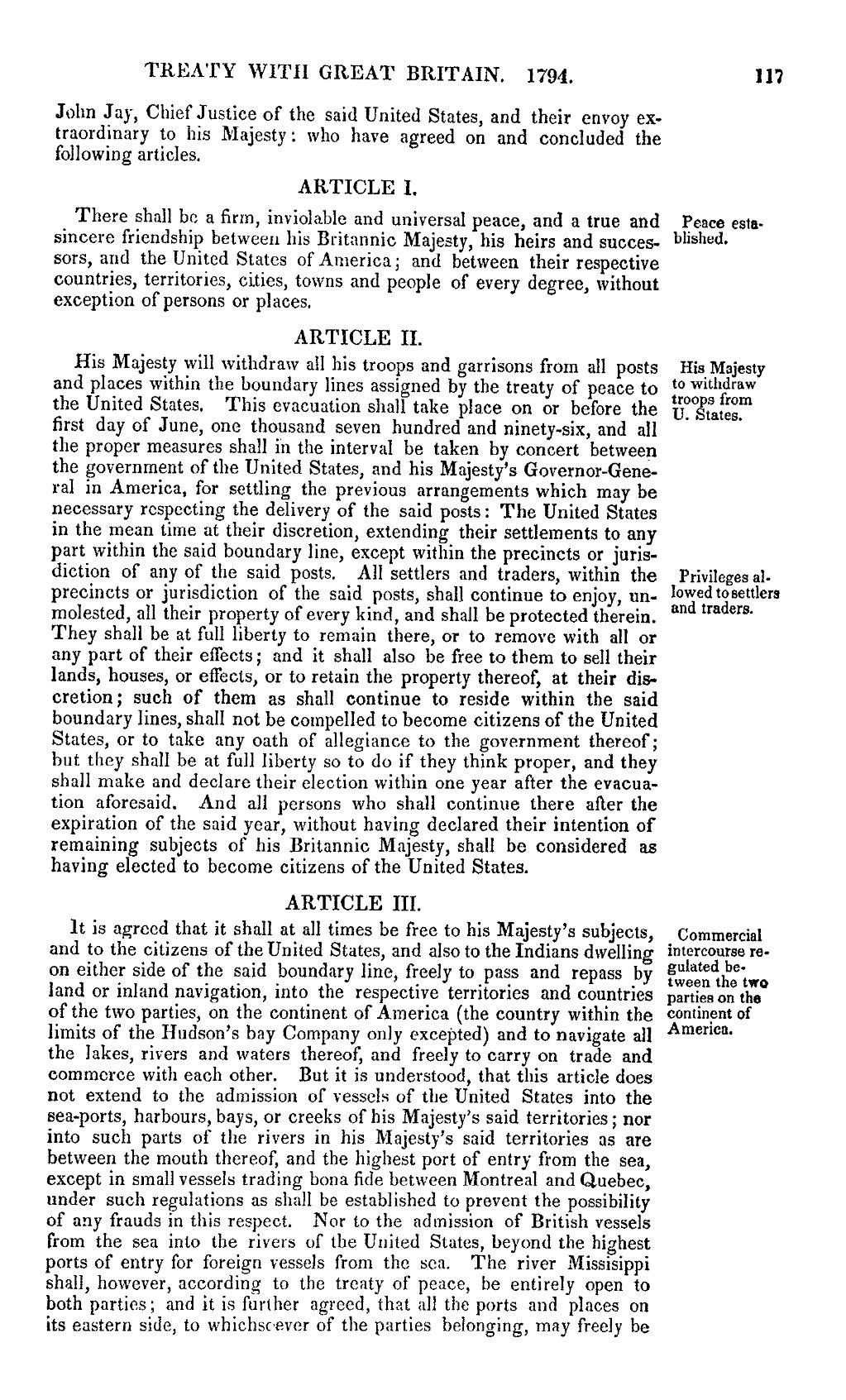TREATY WITII GREAT BRITAIN. 1794. ll? John Jay, Chief Justice of the said United States, and their envoy extraordinary to his Majesty: who have agreed on and concluded the following articles. ARTICLE I. There shall be a firm, inviolable and universal peace, and a true and Peace estusincere friendship between his Britannic Majesty, his heirs and succes- bllsh"d· sors, and the United States of America; and between their respective countries, territories, cities, towns and people of every degree, without exception of persons or places. ARTICLE II. His Majesty will withdraw all his troops and garrisons from all posts His Majesty and places within the boundary lines assigned by the treaty of peace to ‘° W"l‘,£l'““’ the United States. This evacuation shall take place on or before the ij°?°§;,,;:Tn first day of June, one thousand seven hundred and ninety-six, and all the proper measures shall in the interval be taken by concert between the government of the United States, and his Majesty’s Governor-General in America, for settling the previous arrangements which may be necessary respecting the delivery of the said posts: The United States in the mean time at their discretion, extending their settlements to any part within the said boundary line, except within the precincts or jurisdiction of any of the said posts. All settlers and traders, within the Privileges alprecincts or jurisdiction of the said posts, shall continue to enjoy, nn- l°‘§€d'g¤€“l€" molested, all their property of every kind, and shall be protected therein. an tm °m' They shall be at full liberty to remain there, or to remove with all or any part of their effects; and it shall also be free to them to sell their lands, houses, or effects, or to retain the property thereof, at their discretion; such of them as shall continue to reside within the said boundary lines, shall not be compelled to become citizens of the United States, or to take any oath of allegiance to the government thereof; but they shall be at full liberty so to do if they think proper, and they shall make and declare their election within one year after the evacuation aforesaid. And all persons who shall continue there after the expiration of the said year, without having declared their intention of remaining subjects of his Britannic Majesty, shall be considered as having elected to become citizens of the United States. ARTICLE III. It is agreed that it shall at all times be free to his Majesty’s subjects, Commercial and to the citizens of the United States, and also to the Indians dwelling i¤i¤1'¢¤¤f¤6 Y6- on either side of the said boundary line, freely to pass and repass by §;;*Q:‘l,:’;,w° land or inland navigation, into the respective territories and countries parties oaths of the two parties, on the continent of America (the country within the ¤<>¤¢i¤§>¤¢ of limits of the Hudson’s bay Company only excepted) and to navigate all Am°"°“‘ the lakes, rivers and waters thereof, and freely to carry on trade and commerce with each other. But it is understood, that this article does not extend to the admission of vessels of the United States into the sea-ports, harbours, bays, or creeks of his Majesty’s said territories; nor into such parts of the rivers in his Majesty’s said territories as are between the mouth thereof; and the highest port of entry from the sea, except in small vessels trading bona fide between Montreal and Quebec, under such regulations as shall be established to prevent the possibility of any frauds in this respect. Nor to the admission of British vessels from the sea into the rivers of the United States, beyond the highest ports of entry for foreign vessels from the sea. The river Missisippi shall, however, according to the treaty of peace, be entirely open to both parties; and it is further agreed, that all the ports and places on its eastern side, to whichsoever of the parties belonging, may freely be
